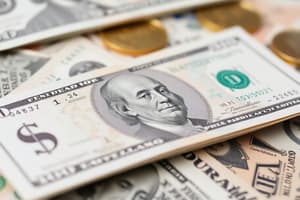Podcast
Questions and Answers
What is inflation?
What is inflation?
- The rate at which the value of currency increases
- The rate at which the economy grows over time
- The rate at which the prices for goods and services increase (correct)
- The rate at which people's savings decrease
Why does an excess supply of currency in an economy lead to inflation?
Why does an excess supply of currency in an economy lead to inflation?
- It increases the value of the currency
- It has no impact on the value of the currency
- It decreases the value of the currency (correct)
- It stabilizes the value of the currency
What determines the value of money in modern economies?
What determines the value of money in modern economies?
- Number of goods and services produced
- Economic growth rate
- Amount of gold possessed by the country
- Amount of currency in circulation (correct)
How does high inflation impact the cost of living in a country?
How does high inflation impact the cost of living in a country?
Why is a healthy inflation rate (2-3%) considered positive?
Why is a healthy inflation rate (2-3%) considered positive?
How does inflation affect economic growth when it is high?
How does inflation affect economic growth when it is high?
What is the primary cause of inflation known as the 'demand-pull effect'?
What is the primary cause of inflation known as the 'demand-pull effect'?
Why do companies raise prices during the demand-pull effect?
Why do companies raise prices during the demand-pull effect?
What role do monopoly or oligopoly industries play in the demand-pull effect?
What role do monopoly or oligopoly industries play in the demand-pull effect?
What is cost-push inflation primarily caused by?
What is cost-push inflation primarily caused by?
How does exchange rates impact inflation in a country?
How does exchange rates impact inflation in a country?
Why is it important for policymakers to understand the causes of inflation?
Why is it important for policymakers to understand the causes of inflation?
Study Notes
Causes of Inflation
Inflation, as defined by the Reserve Bank of India, is the rate at which the prices for goods and services increase. It is a measure of the average change in prices of a basket of goods and services over a period of time. Inflation rates vary from country to country, and they can have a significant impact on the economy and the standard of living of its population. In this article, we will discuss the causes of inflation, focusing on the excess currency supply in an economy and the demand-pull effect.
Excess Currency Supply
One of the primary causes of inflation is an excess supply of currency in an economy. This can occur when the money supply/circulation in a nation grows above the economic growth, reducing the value of the currency. In the modern era, countries have shifted from the traditional methods of valuing money with the amount of gold they possessed. Instead, modern methods of money valuation are determined by the amount of currency that is in circulation.
When there is inflation in a country, the purchasing power of the people decreases as the prices of commodities and services are high. The value of the currency unit decreases, which impacts the cost of living in the country. When the rate of inflation is high, the cost of living also increases, leading to a deceleration in economic growth. However, a healthy inflation rate (2-3%) is considered positive because it directly results in increasing wages and corporate profits.
Demand-Pull Effect
Another cause of inflation is the demand-pull effect. In a growing economy, as wages increase within an economy, people will have more money to spend on goods and services. The increase in demand for goods and services will result in companies raising prices that the consumers will bear in order to preserve their profitability. This is particularly true in industries where there is a monopoly or oligopoly, where companies have the power to raise prices without worrying about losing customers.
Other Factors
There are other factors that can contribute to inflation, such as cost-push inflation. This occurs when a company faces increased input costs on raw materials and wages for manufacturing consumer goods. To maintain their profitability, companies may pass these increased production costs to the end consumer in the form of increased prices. Additionally, exchange rates play a role in determining the rate of inflation in a country. When there is inflation in the country, the purchasing power of the people decreases, and the value of the currency unit decreases, impacting the cost of living in the country.
In conclusion, inflation is caused by a variety of factors, including excess currency supply in an economy and the demand-pull effect. Understanding these causes can help policymakers develop strategies to control inflation and maintain a stable economy.
Studying That Suits You
Use AI to generate personalized quizzes and flashcards to suit your learning preferences.
Description
Learn about the causes of inflation, including the impact of excess currency supply and the demand-pull effect on an economy. Explore how factors like high inflation rates and increased demand for goods and services can lead to a rise in prices and affect the standard of living.




